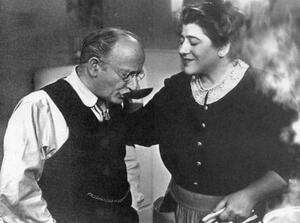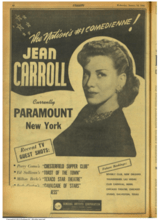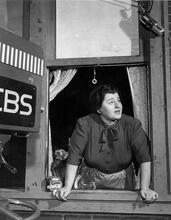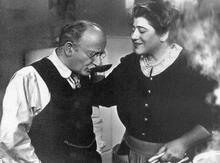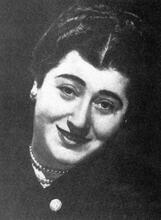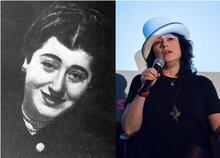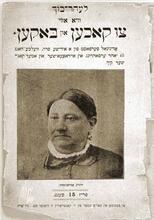Gertrude Berg
In November 1929, The Rise of the Goldbergs premiered on NBC radio, introducing listeners to Jewish matriarch Molly Goldberg and her family. For fifteen years, The Goldbergs was one of the most popular radio series. The celebrity of series creator Gertrude Berg grew accordingly, even if fans confused Berg and Molly Goldberg during public appearances. The Goldbergs premiered on television in January 1949 on CBS to popular acclaim. That momentum stalled when co-star Philip Loeb was blacklisted for alleged Communist activities. Berg resisted demands to fire him; accordingly, CBS and sponsor General Foods cancelled The Goldbergs in 1951. Berg and her show faded away.
Introduction
For a generation of Americans, Gertrude Berg embodied Jewish motherhood in a series of radio, television, stage, and film performances. She is best remembered as the creative force behind the Goldbergs, a fictitious Jewish family who lived in an apartment at 1038 East Tremont Avenue in the Bronx. In addition to her matriarchal public persona, Berg was also one of the first American women to work as a writer and producer of radio and television situation comedy.
From the late 1920s through the mid-1950s, the Goldbergs made appearances on radio, stage, television, and film. In addition to playing Molly, the family matriarch, Berg produced and scripted the Goldbergs’ various outings. On radio, The Rise of the Goldbergs aired on NBC Blue from 1929 to 1934, and then on CBS from 1938 to 1945, making it one of the longest-running series in the medium. Berg presented the Goldbergs live on tour in 1934, and in a Broadway play, Me and Molly, in 1948. The following year, The Goldbergs became one of the first situation comedies on American television on CBS, and continued to appear on different networks until 1954 (CBS, 1949 to 1951; NBC, 1952 to 1953; DuMont, 1954).
The Rise of the Goldbergs
The evolution of the Goldbergs began with the initial radio broadcast of The Rise of the Goldbergs, on NBC in November 1929. In the 1930s and 1940s, Berg’s radio audience measured in the millions, and her wealth and celebrity grew accordingly. In 1936, she signed a five-year, million dollar contract with sponsor Proctor Gamble; by the end of the decade, she was making a reported $7,500 a week to produce, write, and star in her own radio series.
As created by Berg, The Goldbergs offered millions of Americans an image of a second-generation American family whose Jewishness was, for the most part, a matter of comical speech—singsong rhythms, inverted syntax, malapropisms, with only the occasional Yiddish interjection (“nu?” and “oy!”). On The Goldbergs, integration into the American “mainstream” prevailed over immigrant Jewish particularism. Thus, a portrait of George Washington hung prominently in the Goldbergs’ living room on the television series, while a samovar sat discreetly on a sideboard at the back of the dining room. Explicitly Jewish figures and issues appeared in occasional episodes; for example, Jan Peerce sang “Kol Nidre” on a radio broadcast for the High Holidays, and Molly prepared gefilte fish in a 1955 telecast. But during their final season in 1956, the Goldbergs symbolically completed their Americanization (and “rise” into the middle class) by moving from their Bronx apartment to the fictitious suburb of Haverville.
To be fair, Molly was not without her critics. In his April 1954 profile of Berg for Commentary, journalist Morris Friedman noted that Berg, as a performer, was better than her own material, but she remained aloof to the changing times as she continued to play various incarnations of a character whose best days were behind her.
The only child of Dinah and Jacob Edelstein, Gertrude Berg was born Tillie Edelstein on October 3, 1899, in New York City. Her childhood was divided between New York and Fleischmanns, a town in the Catskills, where her family ran a resort hotel. Here she produced and wrote skits to entertain the hotel’s guests. (In 1935, Berg produced a second radio program, The House of Glass, inspired by her experiences in her family’s hotel.) While working in the Catskills, she met Lewis Berg. They married in 1918 and were eventually parents to a son, Cherney, and a daughter, Harriet.
Berg’s maternal grandmother, Czerna Goldstein, served as the blueprint for Molly Goldberg. Czerna’s affection and warmth made an impression on Berg, as did her devotion to family and community. Berg’s father, Jake Edelstein, a restless soul who spent most of his life and money chasing the American Dream, inspired Molly’s husband Jake, whose own get-rich-quick schemes exasperated his family. Berg’s children were the models for Molly’s son and daughter, Sammy and Rosalie.
After writing and performing an original sketch for NBC-TV in 1940, Berg considered a live stage version of The Goldbergs as a means of testing its visual appeal. Several years later, her 1948 play, Me and Molly, made its Broadway debut. The show lasted only 156 performances, but still long enough to convince Berg that it was time to move to television. The Goldbergs premiered on CBS in January 1949, to significant fanfare and critical acclaim.
The Blacklist
Ironically, Berg was, at the time, trying to save the career of her co-star, Philip Loeb, who played Jake Goldberg on both the Broadway and television versions of The Goldbergs. Much the result of his vocal support of civil rights and union politics, Loeb was blacklisted in 1950, named in Red Channels with 151 other entertainers for alleged Communist activities.
Beginning in September 1950 and during the entire run of her show’s second season, Berg appealed to Frank Stanton, president of CBS television, and Clarence Francis, president of program sponsor General Foods, to intervene. Both Stanton and Francis demanded instead that Berg fire Loeb, but she refused. She thought it disgraceful that he was hounded simply because he refused to sign a network loyalty oath or apologize for any political activities (as Francis and Stanton demanded he do).
Berg paid the price for her loyalty. General Foods dropped its sponsorship of The Goldbergs at the end of 1950-51 television season, a move that Lewis Berg predicted if his wife didn’t fire Loeb. CBS cancelled the program in June 1951. Berg was left to deal with her ruined career, and four years later, Loeb committed suicide. NBC picked The Goldbergs up in 1953, but sponsors and viewers were scarce, and the show was cancelled again. The DuMont Network bought The Goldbergs in 1954, but the network, in failing financial health, was unable to honor its multi-million-dollar contract with Berg. She then signed a national syndication deal, but the show still failed to gain traction. After more than a quarter of a century on the air, The Goldbergs faded away with little fanfare—and with little mention of the significant role that the broadcasting industry blacklist played in its demise.
Conclusion
What remained of Berg’s career could be found in frequent summer stock or television appearances. In both, she played to audiences a fraction of the size that she knew at the height of her celebrity. However, her work should not be ignored—Berg’s career spanned the course of early network radio and TV broadcasting—and her contributions to the broadcast industry should not limited to just one character or franchise. Rather, she also should be celebrated for the courage and resolve she demonstrated in fighting the blacklist—and the cost of that fight to her career.
Gertrude Berg died on September 14, 1966.
Antler, Joyce. “Imagining Jewish Mothers in the 1950s.” In Women’s America: Refocusing the Past, edited by Linda K. Kerber, Jane Sherron De Hart, Cornelia Hughes Dayton, and Judy Tzu-Chun Wu, 559-68. New York: Oxford University Press, 2016.
Antler, Joyce. “A Bond of Sisterhood: Ethel Rosenberg, Molly Goldberg, and Radical Jewish Women of the 1950s.” In Secret Agents: The Rosenberg Case, McCarthyism, and Fifties America. edited by Marjorie Garber and Rebecca L. Walkowitz, 197-214. New York: Routledge, 1995.
Brook, Vincent. “The Americanization of Molly: How Mid-Fifties TV Homogenized ‘The Goldbergs’ (And Got ‘Berg-larized’ in the Process),” Cinema Journal 38, no. 4, (Summer 1999): 45-67.
Freedman, Morris. “From the American Scene: The Real Molly Goldberg,” Commentary, April 1956, https://www.commentarymagazine.com/articles/from-the-american-scene-the-real-molly-goldberg/.
Ingall, Marjorie. “Remembering the Emmys’ First Best Actress Winner,” Tablet, September 17, 2018, https://www.tabletmag.com/jewish-life-and-religion/270647/gertrude-berg-best-actress-emmy.
Smith, Jr. Glenn D. Something on My Own: Gertrude Berg and American Broadcasting, 1929-1956. Syracuse, NY: Syracuse University Press, 2007.
Smith, Jr. Glenn D. “’The Guiding Spirit’: Philip Loeb, the Battle for Television Jurisdiction, and the Broadcasting Industry Blacklist,” American Journalism: A Journal of Media History 26, no. 3, (Summer 2009): 93-126.
Stabile, Carol A. “Red Networks: Women Writers and the Broadcast Blacklist.” Lecture presented for the 39th Annual Morris Fromkin Memorial Lecture, University of Wisconsin-Milwaukee Libraries, Milwaukee, WI, October 2, 2008, https://minds.wisconsin.edu/handle/1793/46194.
Weber, Donald. Haunted in the New World: Jewish American Culture from Cahan to The Goldbergs. Bloomington: Indiana University Press, 2005.
Weber, Donald. “Taking Jewish American Popular Culture Seriously: The Yinglish Words of Gertrude Berg, Milton Berle, and Mickey Katz” Jewish Social Studies 5, no. 1/2 (Fall 1998/Winter 1999): 123-53.

